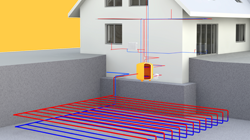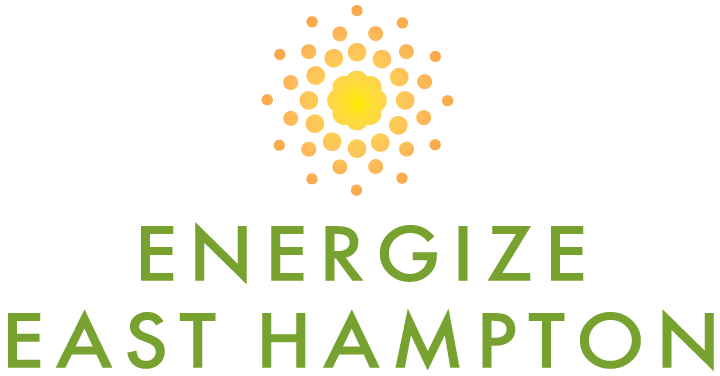East Hampton’s 100% renewable energy goals go beyond the electricity sector (getting 100% of annual community-wide electricity consumption from renewable sources is anticipated for 2023). The adopted goals include that the equivalent of annual community energy consumption in two additional sectors – transportation and heating – be achieved with renewable energy sources by 2030.
Renewable heat is an application of renewable energy and refers to the renewable generation of heat rather than electrical power (e.g., replacing a fossil fuel boiler using concentrating solar thermal to feed radiators). Renewable heat technologies include renewable biofuels, solar heating, geothermal heating, heat pumps and heat exchangers to recover lost heat, with significant attention also applied to insulation. In New York State, conventional heating and cooling systems are responsible for 37% of energy consumption and 32% of greenhouse gas emissions. Thus, clean heating and cooling technologies are making it possible for homes to stay comfortable year round, save energy, and reduce carbon footprints.
Heat Pumps
Heat pumps are two to four times as efficient as conventional oil, propane, or electric resistance heating, and ground source heat pumps provide cooling much more efficiently than other systems. They are also a safer and healthier choice for homes, with no combustion of fossil fuels, fuel storage, or carbon monoxide emissions in the home.

There are two primary types of heat pumps sold today—air source and ground source heat pumps. When buying or replacing your heat pump, always look for ENERGY STAR® certified heat pumps, which are more energy efficient than other options. In addition, the Coefficient of Performance (COP), Seasonal Energy Efficiency Ratio (SEER), and Heating Seasonal Performance Factor (HSPF) can help determine which option or model will be the most energy efficient. The higher the rating, the more efficient the heat pump will be.

Ground source heat pumps (aka geothermal heat pumps) extract heat from the ground during cold weather via an underground pipe system, which is then distributed throughout your home or business. During warmer months, the process is reversed to provide cooling.
Rebates & Tax Credits
If purchasing a heat pump, you may be eligible to receive a tax credit and/or a financial incentive. Visit PSEG-LI’s Home Comfort page to learn about customer rebates of up to $1,500/ton for air-source heat pumps. Visit their geothermal heat pump page to learn about PSEG-LI rebates ranging from $1,200 to $6000.
Which Heat Pump System Should I Choose?
Use the NY State Clean Heat Pump Planner to find out which heat pump system would work best for your home, based on whether you have a single or two story home, have existing ducts for heating or cooling, or would be better off with ductless systems.
The term ‘equivalent’ means that excess annual renewable electricity produced (or interconnected) in East Hampton would be credited (offset) against remaining fossil fuel usage in the transportation and heating sectors.
Finding Contractors
The Town of East Hampton’s Green Heating & Cooling campain makes it easy for you to find a pre-qualified installation partner(s) who will contact you with more information and to schedule site assessment. Simply check the Green Heating & Cooling (Green Team LI) checkbox in our online Tell-Me-More form.
